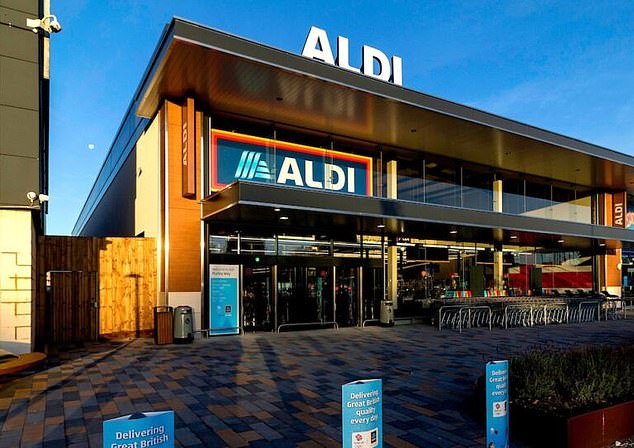[ad_1]
Aldi has revealed the location of 23 potential new stores as part of a record £1.6billion expansion over the next two years.
The German-owned supermarket says it plans to open 80 stores across 2026 and 2027 as part of the investment.
It comes as Aldi boss Giles Hurley warned Rachel Reeves not to hike supermarkets’ costs at her upcoming Budget, as sales topped £18billion in the UK and Ireland last year.
Currently, Aldi, the UK’s fourth-largest supermarket, has more than 1,050 UK stores with a long-term goal of reaching 1,500 stores.
New locations being targeted include locations in London, the West Midlands, Manchester, Yorkshire, South Wales, East Sussex and the Isle of Wight.
Hurley, chief executive of Aldi UK, said: ‘Shoppers are still finding things difficult and that’s why we’re staying laser-focused on doing what Aldi does best – offering customers great quality products at unbeatable prices.
‘Nobody else is making the same commitment to everyday low prices – no clubs, no gimmicks, no tricks – just prices our customers can trust, and quality they can depend on.
‘Since we opened our first UK store more than 35 years ago, we’ve brought high-quality, affordable groceries to almost 800 towns and cities, but there are hundreds more communities that don’t have an Aldi nearby.’

Aldi says it plans to open 80 stores across 2026 and 2027 as part of the record £1.6billion investment
Many large retailers have blamed rising costs – mainly employer national insurance contributions and new packaging taxes – for helping worsen food inflation in the UK.
Shopping habits have changed as a result, with people more keen to hunt down lower prices, Hurley said.
This had made Aldi ‘more popular than ever’, with shoppers increasingly switching to make it their regular supermarket.
Speaking earlier this week, Hurley warned that any policy changes that would affect the operating costs of business ‘should be considered very, very carefully’.
Recent increases, including the hike in employer National Insurance contributions and a new packaging levy have already ‘rippled through to prices on the shelf edge,’ he added to the BBC.
And shoppers are still ‘finding things difficult’ he explained, as more Britons flocked to the German retailer this year.
The retailer said it made £18.1billion in sales last year, compared to £17.9billion in 2023.
But it said profits were hit by a fierce price war between rivals including fellow discounter Lidl and traditional heavyweights Tesco and Sainsbury’s.
Profits fell from £552.9million to £435.5million as the business invested in prices, infrastructure and boosting staff wages.
Its market share has grown to 10.8 per cent, according to figures from data firm Worldpanel last month.
Mr Hurley said: ‘Shoppers are still finding things difficult and that’s why we’re staying laser focused on doing what Aldi does best – offering customers great quality products at unbeatable prices.
‘Nobody else is making the same commitment to everyday low prices – no clubs, no gimmicks, no tricks – just prices our customers can trust and quality they can depend on.’

Aldi UK chief executive Giles Hurley warned policies affecting the operating costs of business ‘should be considered very, very carefully’ ahead of November 26 budget
His comments came as trade group the Food and Drink Federation (FDF) warned that food inflation could hit 5.7 per cent by the end of December. It was 4.2 per cent in August, according to the British Retail Consortium.
Retailers have urged the government to rule out further increases to the cost of doing business, as well as taking a second look at its reform of business rates.
The sector says thousands of big shops will be forced to pay more under the Chancellor’s proposals, which could lead to more job losses and store closures.
Aldi boss Hurley said the industry was still waiting for the ink to dry on business rates changes, but that Labour should ‘consider very carefully’ any potential cost increases.
‘We do need domestic policy which challenges that stubborn inflation that we’re seeing at the moment. And therefore we would encourage the government to adopt policies which don’t inadvertently add to the costs of businesses in the food sector.’
And he said the Budget – which has been called for 26 November, later than usual – had ‘no doubt’ created ‘a bit of uncertainty’ among consumers.
He added: ‘If you ask customers, the inflationary challenges are just tremendously challenging because they come on top of bills elsewhere going up. So they’re really unwelcome [for households]. Groceries have become a bigger portion of household income.’
Shoppers have increasingly been ‘treating themselves’ with premium dine-in meals instead of going to restaurants, he said.
SAVE MONEY, MAKE MONEY

Sipp cashback

Sipp cashback
£200 when you deposit or transfer £15,000
4.38% cash Isa
4.38% cash Isa
Trading 212: 0.53% fixed 12-month bonus

£20 off motoring

£20 off motoring
This is Money Motoring Club voucher

Up to £100 free share

Up to £100 free share
Get a free share worth £10 to £100

No fees on 30 funds

No fees on 30 funds
Potentially zero-fee investing in an Isa or Sipp
Affiliate links: If you take out a product This is Money may earn a commission. These deals are chosen by our editorial team, as we think they are worth highlighting. This does not affect our editorial independence. Terms and conditions apply on all offers.
[ad_2]
This article was originally published by a www.dailymail.co.uk . Read the Original article here. .

